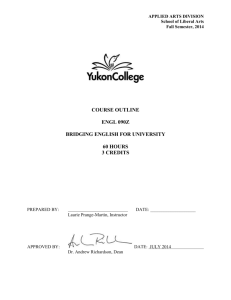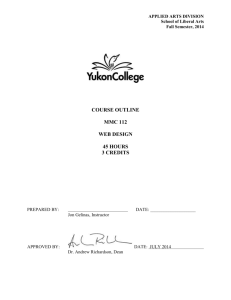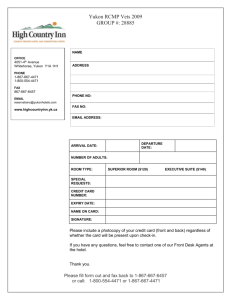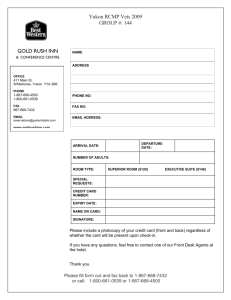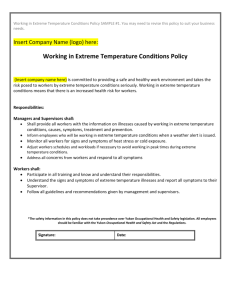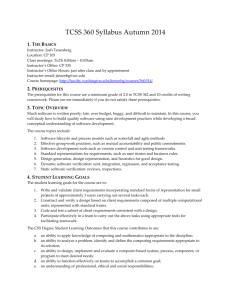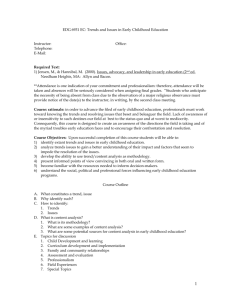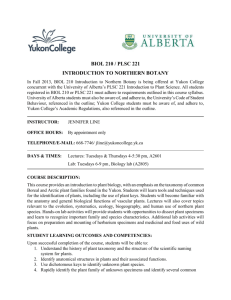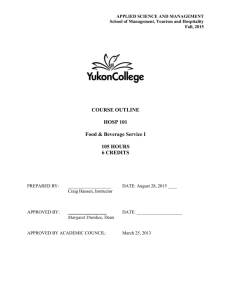COURSE OUTLINE Bus 281 Human Resource
advertisement
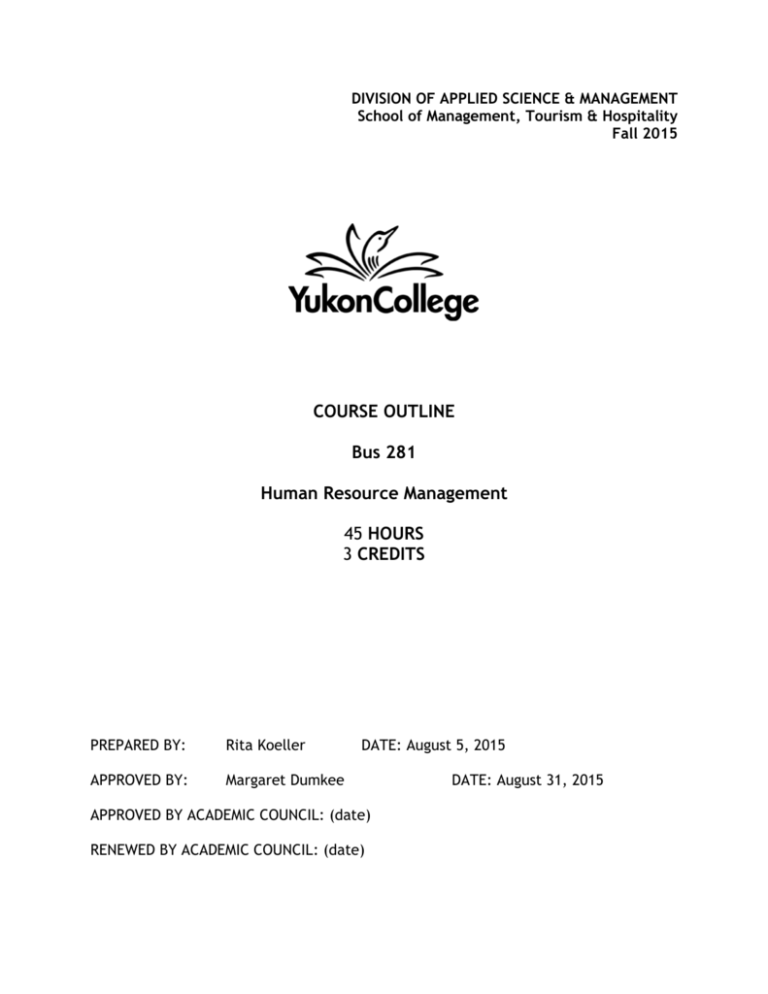
DIVISION OF APPLIED SCIENCE & MANAGEMENT School of Management, Tourism & Hospitality Fall 2015 COURSE OUTLINE Bus 281 Human Resource Management 45 HOURS 3 CREDITS PREPARED BY: Rita Koeller APPROVED BY: Margaret Dumkee DATE: August 5, 2015 APPROVED BY ACADEMIC COUNCIL: (date) RENEWED BY ACADEMIC COUNCIL: (date) DATE: August 31, 2015 BUS 281 Coure Outline by Rita Koeller is licensed under a Creative Commons AttributionNonCommercial-ShareAlike 4.0 International License. 2 DIVISION OF APPLIED SCIENCE & MANAGEMENT School of Management, Tourism & Hospitality Fall 2015 HUMAN RESOURCE MANAGEMENT INSTRUCTOR: Rita Koeller OFFICE LOCATION: TBA OFFICE HOURS: By appointment CLASSROOM: RM 2402 E-MAIL: rkoeller@yukoncollege.yk.ca TIME: 9:00am – 12:00pm TELEPHONE: 668-8762 (messages) DATES: Friday, Sept. 11th to Dec. 4th/15 COURSE DESCRIPTION This course helps students build the proficiency needed to understand the foundations of human resource management in the workplace. Students will be introduced to current human resource management concepts, theories, skills and practices with hands-on applications and strategic thinking within the field. Students will also develop skills in active listening, conflict resolution, performance management scenarios, negotiations and presentation skills. PREREQUISITES None required. RELATED COURSE REQUIREMENTS None required. EQUIVALENCY OR TRANSFERABILITY CAMO CAPU NIC TRU Bus 210 (3) Badm 302 (3) Bus 255 (3) Hrmn 2821 (3) UFV UNBC UNBC VIU Bus 201 (3) Comm 330 (3) Comm 2xx (3) Mgmt 293 (3) 3 LEARNING OUTCOMES Upon completion of this course students should be able to: • Understand the difference between human resource management and strategic human resource management • Understand the importance of human resource management in the workplace and how it contributes to the success of an organization • Communicate effectively with colleagues in meetings by employing individual strengths and implementing knowledge of different working styles • Deliver professional, oral presentations • Develop their own strategic thinking, negotiation and conflict resolutions abilities COURSE FORMAT: This is mainly a classroom-based course. Topics will be covered through real life examples that encourage students to work with authentic documents and scenarios. Written and oral responses to these documents will be used to facilitate discussion and ground theory in real world examples. Students are encouraged to use handouts, the Internet and referenced course materials as tools to respond to the case study assignments. The instructor will aim to keep the course material interactive and varied. In order to cater to a variety of learners, lectures using video, print visuals, audio, and group work will be employed along with student-led negotiations. Email and frequent email access are an important part of this course. The instructor will communicate through emails and Moodle. The use of Moodle is mandatory and an orientation will be provided. ASSESSMENTS Attendance & Participation: Success in this course depends on attendance and participation. It is your responsibility to take notes, to obtain missed assignments, announcements, or materials for any classes you have missed. Attendance and participation is critical to your success in this course. This course involves role plays, conflict negotiations, case studies and presentations all which require attendance and participation in the course. 4 Demonstrated Leadership: Demonstrated leadership assessment is more effective than a general "class participation" grade. As you perform specific tasks and participate in scenarios, you show the instructor and the class that you are thinking like a business professional and improving your understanding of the discipline. You may earn this 10 percent of your grade if you: 1. Actively participate regularly in class. 2. Come prepared for the case studies and conflict role plays. 3. Ask strategic questions. 4. Complete homework assignments. 5. At the end of the class, you will submit a rationale to the instructor explaining why you should get the 10 percent credit for demonstrating leadership. You will also submit the letter grade you think you have earned. This is your own performance management self-review. 6. There will also be a peer review factor to your grade. Please include these thoughts when writing your rationale at the end of term. Assignments Assignment/ Exam Breakdown Assignment 1: Presentation Assignment 2: Negotiation Simulation % of Final Mark 15% 10% Assignment 3: Case Studies -Ongoing each week 5% Assignment 4: Question & Answer Period Ongoing each week Mid-Term Exam 5% Demonstrated Leadership 20% Final Exam TOTAL 25% 100% 20% 5 Exam There will be a midterm exam and a final exam. Both will cover material presented through class lectures, course materials, case studies and student presentations. The final exam will be cumulative. If you must miss an exam for valid reason, it is your responsibility to let the instructor know in advance that you will be unable to write and to arrange an alternate test time with before the scheduled test. Examples of acceptable (valid) reasons for missing a scheduled evaluation include personal illness (supported by a doctor’s note) or absence required by your employer (supported by a letter from your employer). As with the assignments, if you miss an exam, there will be a 10% per day penalty applied, beginning immediately after class. No one is allowed to write the midterm exam once marked midterms have been handed back to the class. EVALUATION Assignments Midterm Exam Participation Final Exam Total 35% 20% 20% 25% 100% REQUIRED TEXTBOOKS AND MATERIALS There is no required text for BUS281. However, the texts listed below can serve as a valuable resource to the interested student. These texts are available on short term loan at the library. Schwind, Herman F., Das, Hari & Wagar, Terry H. (2013). Canadian Human Resource Management - A Strategic Approach, 10th Edition. McGraw-Hill Ryerson, 594 pp. Godard, John. Industrial Relations, The Economy and Society, 2nd ed. Captus Press Inc, Concord. 2005. McShane, Steven; Steen, Sandra. Canadian Organizational Behaviour, 8th ed. McGraw Hill Ryerson, 2012. 6 ACADEMIC AND STUDENT CONDUCT Information on academic standing and student rights and responsibilities can be found in the Academic Regulations: http://www.yukoncollege.yk.ca//downloads/Yukon_College_Academic_Regulations_a nd_Procedures_-_August_2013_final_v1.pdf PLAGIARISM Plagiarism is a serious academic offence. Plagiarism occurs when students present the words of someone else as their own. Plagiarism can be the deliberate use of a whole piece of another person’s writing, but more frequently it occurs when students fail to acknowledge and document sources from which they have taken material. Whenever the words, research or ideas of others are directly quoted or paraphrased, they must be documented according to an accepted manuscript style (e.g., APA, CSE, MLA, etc.). Resubmitting a paper which has previously received credit is also considered plagiarism. Students who plagiarize material for assignments will receive a mark of zero (F) on the assignment and may fail the course. Plagiarism may also result in dismissal from a program of study or the College. YUKON FIRST NATIONS CORE COMPETENCY Yukon College recognizes that a greater understanding and awareness of Yukon First Nations history, culture and journey towards self-determination will help to build positive relationships among all Yukon citizens. As a result, to graduate from ANY Yukon College program, you will be required to achieve core competency in knowledge of Yukon First Nations. For details, please see www.yukoncollege.yk.ca/yfnccr. ACADEMIC ACCOMMODATION Reasonable accommodations are available for students requiring an academic accommodation to fully participate in this class. These accommodations are available for students with a documented disability, chronic condition or any other grounds specified in section 8.0 of the Yukon College Academic Regulations (available on the Yukon College website). It is the student’s responsibility to seek these accommodations. If a student requires an academic accommodation, he/she should contact the Learning Assistance Centre (LAC) at (867) 668-8785 or lassist@yukoncollege.yk.ca. TOPIC OUTLINE Chapter references refer to the Schwind, Das & Wagar text, 10th Edition. 7 Class Date Sept 11 Sept 18 Week 1 2 Sept 25 3 Oct. 2 4 Topics Resources Introduction to HRM ∙HRM activities and roles ∙Professionalism in a HRM context SHRM vs HRM Business Planning Tools Conflict in the Workplace & Active Listening ∙Conflict Resolution ∙What is Active Listening and Skill Practice Meeting Legal Requirements ∙Canadian Charter of Human Rights ∙Employment Equity Act ∙Employment Standards Act Human Resource Policy ∙Effective Policy Writing Turnover ∙Ch. 1 ∙www.chrp.ca Handouts Chapter 4 & Handouts 5 Recruitment & Selection Oct 16 6 Orientation & Training Development & Career Planning Oct 23 7 Oct 30 8 Nov. 6 9 Nov 13 10 Nov 20 11 Nov. 27 12 Dec.4 13 Dec 7th -18th 14 Role Play Practice Presentations Begin Case Study Handouts Chapter 5 & 6 Oct 9 Assignments Chapter 7 Case Study Case Study Mid-Term Examination Performance Management Chapter 8 Managing Employee Relations ∙Positive/Progressive discipline ∙Terminations The Union-Management Framework ∙Philosophy of Unionism ∙Functions of Unions Collective Agreements ∙ The Collective Bargaining Process Union as organizations Negotiation Simulation Prep Role Play Chapter 11 Case Study/Role Play Chapter 13 Role Play Chapter 13 Negotiation Simulation Negotiation Debrief and Final Exam Review Final Exam – Date TBA 8
